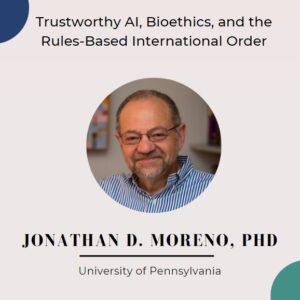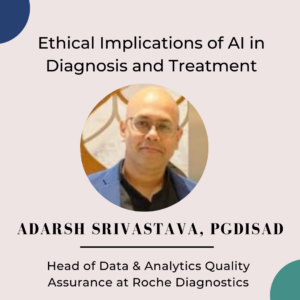2024 Winter School Online
Keynote Speakers

Jonathan D. Moreno is the David and Lyn Silfen University Professor at the University of Pennsylvania, where he is a Penn Integrates Knowledge (PIK) professor. At Penn he is also Professor of Medical Ethics and Health Policy, of History and Sociology of Science, and of Philosophy. His most recent books are Everybody Wants to Go to Heaven but Nobody Wants to Die: Bioethics and the Transformation of Healthcare in America, co-authored with Penn president Amy Gutmann; and The Brain in Context: A Pragmatic Guide to Neuroscience, written with neuroscientist Jay Schulkin. Among Moreno’s previous books are, The Impromptu Man: J.L. Moreno and the Origins of Psychodrama Encounter Culture and the Social Network and The Body Politic which was named a Best Book of 2011 by Kirkus Reviews; Undue Risk, nominated for the Virginia Book Award; and Mind Wars, which was referenced by the screenwriter of The Bourne Legacy. He has published more than a thousand papers, articles, reviews and op-eds. Moreno’s writings have been translated into German, Japanese, Korean, Portuguese and Romanian. Moreno is senior consultant to a six-year, 10 million euro project on cold war medical science on both sides of the iron curtain, funded by the European Research Council. Moreno’s op eds have been published in venues including The New York Times, The Wall Street Journal, Science, Nature, Slate, Politico, The Hill, Foreign Affairs, Axios.com, The Huffington Post, and Psychology Today. He often appears on broadcast and online media. He was co-host of Making the Call, an Endeavor Content podcast and was a columnist for ABCNews.com. Formerly Moreno was a senior fellow at the Center for American Progress in Washington, DC. and editor of the online magazine Science Progress. The American Journal of Bioethics has called him “the quietly most interesting bioethicist of our time.” Moreno is an elected member of the National Academy of Medicine. He has served as a staff member or adviser to many governmental and non-governmental organizations, including the UNESCO International Bioethics Committee, three U.S. presidential commissions, the Department of Defense, the Department of Homeland Security, the Department of Health and Human Services, the Centers for Disease Control, the Federal Bureau of Investigation, the Howard Hughes Medical Institute, and the Bill and Melinda Gates Foundation. In 2008-09 he served as a member of President Barack Obama’s transition team. Moreno received his Ph.D. in philosophy from Washington University in St. Louis, was an Andrew W. Mellon post-doctoral fellow, holds an honorary doctorate from Hofstra University and is a recipient of the College of William and Mary Law School Benjamin Rush Medal, the Dr. Jean Mayer Award for Global Citizenship from Tufts University, and the Penn Alumni Faculty Award of Merit. He has held the honorary Visiting Professorship in History at the University of Kent in Canterbury, England. In 2018 the American Society for Bioethics and Humanities presented him with its Lifetime Achievement Award. Jonathan D. Moreno, PhD
Trustworthy AI, Bioethics, and the Rules-Based International Order
Although it is not widely noted, the notion of “trustworthy AI” presupposes some ethical standards that are rooted in the concept of liberal democracy. The rules-based international order that was established after World War II is also based on the idea of the liberal, democratic state. In this talk I argue that bioethics itself is woven into this fabric and that changes in the rules-based order raise questions about the future of the field.

With over 14 years of pioneering experience in Data, Analytics, and Research, Adarsh Srivastava leads the Data, Analytics & Research Quality Assurance at Roche Diagnostics. Renowned for his visionary leadership, Adarsh has successfully spearheaded the creation of resilient data analytics solutions, revolutionizing the healthcare sector.
A passionate advocate for AI Ethics, Adarsh has been at the forefront of establishing a robust infrastructure and fostering a culture of competency in ethical AI within Roche. He has championed the integration of ethical considerations into AI development, ensuring transparency, fairness, and accountability in AI systems. His efforts have included creating comprehensive guidelines and promoting an organizational culture that prioritizes the responsible use of AI.
Adarsh’s unwavering commitment to implementing trustworthy AI systems has not only propelled the organization towards innovation but also ensured a future-ready stance to fully leverage AI’s transformative potential. His blend of expertise, foresight, and ethical dedication makes him a trailblazer in driving the future of AI in healthcare, setting a benchmark for ethical standards in the industry. Adarsh Srivastava
Ethical Implications of AI in Diagnosis and Treatment
Artificial Intelligence (AI) is transforming the landscape of healthcare, particularly in the realms of diagnosis and treatment. As AI systems become more sophisticated, they offer unprecedented opportunities to enhance diagnostic accuracy, personalize treatment plans, and improve patient outcomes. However, these advancements also bring significant ethical challenges that must be addressed to ensure the responsible deployment of AI in medicine.
The session will share insights on integrating these ethical principles into AI development and deployment. By presenting case studies and practical guidelines, it will illustrate how ethical considerations can be woven into the fabric of AI systems. The goal is to highlight the importance of an ethical framework that not only propels innovation but also builds trust among stakeholders, ensuring that AI’s transformative potential in healthcare is realized responsibly and equitably.
Participants will gain a deeper understanding of the ethical landscape surrounding AI in healthcare and learn strategies to implement trustworthy AI systems that prioritize patient welfare and uphold the highest ethical standards.
